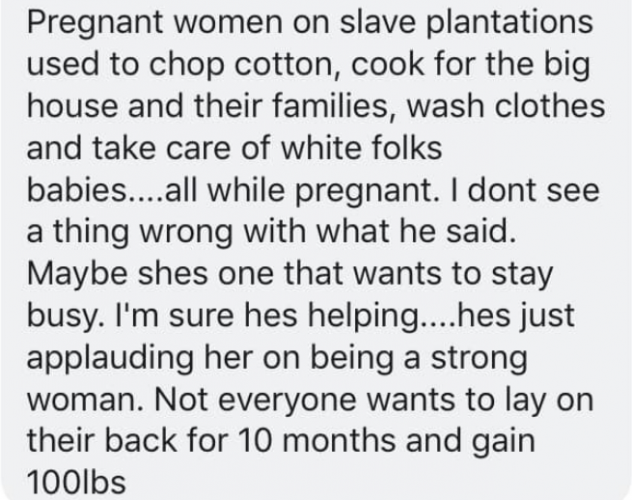Written by Nicole J.
Two black mothers/mother-to-be of twin girls also made it across my screen this week, and since the first post was getting a bit wordy, I had to split it into two.
Honestly, I’m tired of writing about the latest black women to go viral for these kinds of things, so after this blog, it’ll be light and airy for a while.
The first black mom thankfully didn’t go viral for anything quite so devastating, but it does speak to what many people within the community think of black motherhood and black womanhood as a whole. In the photo was a 9-month pregnant black woman being hugged by her black husband as he cradled her burgeoning belly. To preserve anonymity, I have cropped out their names and the photo. Just use your imagination; the picture isn’t the important part. Hubby captioned the photo as follows:

Will you look at that! Mommy is really holding down the fort!
Interestingly enough there’s no mention of what he is doing to lighten her load. From his social media, he started work as a delivery driver in March of this year, and according to salary estimating websites, the average yearly salary they make can range from $28000 to $36000, not including bonuses. So with one child here, and two on the way, maybe that’s why mama is still working and in school full time. And correct me if I’m wrong, but twins generally don’t gestate for the full 40 weeks, right? They usually have to be delivered early for whatever reason, no? All the more reason to sit and relax. Incidentally, since this all happened, he has posted his CashApp so people can purchase baby gifts. Ain’t that something.
Way too many black women view struggle as an inevitability, as part and parcel of being a black woman, as an eventuality for being born both black and female. Similarly, way too many black women are dealing with dudes who do not add any significant value to their lives. Some women were cosigning this arrangement, saying they did all that this mama here did without even having a husband, not realizing how poorly that reflects on this growing family. Though the number of women speaking out against these practices is increasing, we still have to combat against some truly insane thinking. Case in point:

Now, do my eyes deceive me, or is that a screenshot of a black woman using the birthing practices forced on us during slavery as justification for how this woman is going about the remaining weeks of her pregnancy? If that’s how they got down in the 18th century and they survived, of course we can do it now! I mean, now we have luxuries like Wi-Fi, indoor plumbing and air conditioning! Why SHOULDN’T the woman above be at her desk ready to go until she is crowning? To hell with the wonders of modern medicine, epidurals, and bed rest, there’s work to be done!
Lesson: Unfortunately the world at large doesn’t see black women as feminine beings deserving of resting in said femininity, even when she is most feminine (pregnant) but, as it turns out, neither does a segment of other black women. Also, stop having children while broke, or for dudes who are broke. Ladies, we have to better than this.
The second story, covered by Fox News, the Today show, and other prominent outlets, features a 23 year old black woman who completed a spectacular achievement of earning a dual bachelor’s (in cardiovascular sonography) and master’s degree (in health sciences) program after delivering beautiful twin girls via C-section. Prior to the arrival of her babies, she had completed a bachelor’s degree in biology.
She has a total of three degrees with a health focus and still can’t master birth control. Um…
Maybe it’s my naturally cynical nature, but I find no part of this story inspirational. It is still the same old struggle narrative, just with a slightly happier ending.
Black woman falls pregnant out of wedlock at an inopportune time? Check.
Baby daddy bails on her the minute the sperm made contact with the eggs, or shortly thereafter? Check.
Blaming the devil for her poor choices (“The devil really had me!”)? Check.
Black woman has the babies, and is back in school a week after a twin delivery via C-section with no down time, adding weight to the incorrect belief that black women are superheroes that can do it all?
Black people commending her for her hard work and perseverance, (which I’m not denying), yet not realizing the wider implications of how this isn’t a good look?
Normalizing single motherhood among black women?
And don’t forget the ever present “strong independent woman who don’t need no man” trope that follows us every damn where. Check, check, checkity check.
Lesson: Contrary to popular belief, black girl magic isn’t about doing it all and making a dollar out of 15 cents. At its core, black girl magic is a happy, shiny way to say that we are surviving because of the consequences of poor choices made, rather than thriving. Black single motherhood is the rule, and married black women with in tact homes is sadly becoming (or already is) the exception.
This black girl magic narrative that we are superwomen, can do anything, and will overcome the odds in the face of adversity and triumph at the end of a difficult challenge is what is killing black women of all ages.
I had a quick scroll through Mom #2’s social media and found some interesting tidbits. Sidebar: for anyone reading this, please make sure your social media privacy settings are turned up to 1000, because hers (and the guy above, too) is wide open for public consumption. Anyway. She went to Nova Southeastern University, which I see is a prestigious private school in south Florida. She paid for her education with “the maximum student loans I was given”, which means she is starting her career and motherhood saddled with debt. Thankfully she was very judicious in selecting a lucrative field, one good thing to learn from (i.e., pick a degree that pays) so hopefully she knocks that debt out quickly. She hasn’t found a job yet, but hopefully that part comes soon. Juggling full time employment with two babies and no one to divide childcare duties is hard, and could have been avoided if she was more careful with her reproductive habits.
What else did I learn from perusing her social media account? Well, she was alone in all her beautiful maternity photos. When reminiscing about how the twins came to this world on their first birthday earlier this year, she said she drove herself to the hospital after her water broke. She was “scared” because “what was I going to do with two kids alone?” Most tellingly, she also stated “this entire process has truly been an eye opener from going through pregnancy alone, giving birth alone, and taking care of you guys alone” (emphasis mine).
Wow, what an amazing story, right?
Not to me. Nobody should have to bring new life into the world on their own, or commemorate what is supposed to be a joyous occasion (first time parenthood) with only half of the equation that lead to said parenthood.
When you see stories like these, black women who are high risk by default because of twin pregnancies, working until the millisecond before they deliver, is it any surprise that black women suffer such high maternal mortality rates? I’ve never experienced pregnancy or childbirth, but it doesn’t take an OB/GYN to know that the process will put your body through the ringer, even with all sorts of resources backing you! Athlete extraordinaire Serena Williams Ohanian had to deal with complications of being pregnant while black, and she is a world famous multimillionaire with access to resources few of us will ever see. What of the regular black women with a tiny or absent support network?
Black people complain about how oppressed we are by the dominant society, yet do preventable things like bear children at inopportune times and default them to the struggle position the second they exit the womb. And on top of that, others praise it like it’s some commendable thing. We blame our mortality rates on medical racism and generational poverty, but little is said of being a breadwinner while pregnant as an added stressor that can negatively affect mom and baby/babies. Isn’t the goal of becoming a parent to provide a better life for your children than you had yourself? I’m not saying these mothers can’t provide that, but by having children by men who are insufficient or altogether absent providers makes that needlessly difficult.
So to my fellow black women, especially those of you in your teens and twenties, but also anybody who has not hit menopause yet, listen up. If you disagree with everything I said up until here and think I’m talking out my ass, so be it, but that doesn’t reduce the message in bold below.
If you truly value yourself, you will use these women’s experiences as a cautionary tale, so you don’t have to learn the hard way. I didn’t need to put my hand in a fire to know that I would get burned. I learned from what I was told and from what others have experienced.
You know what is a true sign of a Strong Black Woman? Valuing your livelihood and your femininity so much where you use TWO forms of reliable birth control the moment you even think a functioning penis with viable sperm will be in the vicinity of your vagina. If you can’t resist the urge to potentially make a life ruining choice by birthing out of season, the LEAST you can do is only deal with marriage material men, and even then, make sure your birth control strategy is airtight. Motherhood is the greatest indicator of poverty. You can remove yourself from an avoidable struggle narrative with abstinence, condoms, pills, patches, implants, an IUD, or an ovulation tracker, or a combination of these simultaneously.
I desperately hope for the day when black motherhood will not be synonymous with absentee fathers, constant struggle, or on the news rallying for a cause. Honestly, this goes beyond swirling and mate selection tactics and fuckboys. To change our motherhood PR, we collectively need to DRASTICALLY change our approach to how we become parents in the first place. Otherwise we will keep failing our children and continue to birth the next generation of what Kendall St. Charles aptly refers to as the “permanent underclass”.
If you stayed with me this far, thank you. This is my longest blog to date. Let me know what you think in the comments below.